Advertorial — Everything You Need to Know

An advertorial is a great tool to enhance your brand’s reach, authority, and revenue.
With tons of advertisements flooded toward customers every single day, it’s become crucial to draw their attention in more creative ways.
Many users have also started using ad blockers and it shows how frustrated they are with low-quality ads. And thus, advertorials can be a handy weapon to break these barriers and reach your potential customers.
But we know you might have many questions and that’s why you’re here!
In this blog post, we’ll cover everything from the basics and comprehensive aspects — advertorial definition, benefits, how to write an advertorial, and the best advertorial examples.
What is an Advertorial?
An advertorial is a 'blend word' made up of "advertisement" and "editorial" — because it's the type of advertisement that's written in a format and style of editorial content — and thus, the term “advertorial”.
In simpler terms, you can call it a “paid post” as well, but it’s imperative to have that editorial value, format, and style in such posts. Or else, readers may feel betrayed or trapped into reading your “advertisement” and you’ll lose their trust and attention too.
Broadly speaking, an advertorial could be published in different forms and not necessarily through a post or article only. It could be a special webpage or even a video.
What Are the Benefits of Using an Advertorial?
You might ask — why use advertorials in the first place?
Well, the short answer is that it can help your brand reach a vast audience and attract their attention toward your brand. If you look at the top three most popular publications worldwide, they reach nearly 14.7 million online subscribers (as of December 2022):
- The New York Times: 8.8 million online subscribers
- The Wall Street Journal: 3.2 million online subscribers
- The Athletic: 2.7 million online subscribers
And there are plenty of other online publications that you can leverage to promote your products or services. Here are some other key advantages of using an advertorial:
-
Helps Gain Better Engagement
Nearly 74% of users think they come across too many ads and 44% of users say the ads are not relevant to their wants or needs. Since customers typically avoid conventional advertisements, you can leverage this creative form of advertising to gain better engagement.
-
Raises Your Brand Awareness
When advertorials are published in digital publications, it helps you reach a broad audience, even globally, who might not even know about your brand. Thus, advertorials can help spread the word about your brand and increase the authenticity of your brand.
Learn more: 5 Winning Tips to Improve Customer Experience for Your Online Store
-
Gives You an Opportunity to Share More Details
Typically, ads don’t have much room to include detailed information about your product. You have to advertise your product with the least possible words or the fewest possible minutes/seconds in the case of video ads. However, since advertorials allow you to create long-form content, you can go into depth about your brand or product by incorporating it into your advertorial.
-
Increases Your Sales and Conversion
Advertorials can help drive potential customers to your website and increase your sales opportunities. And if done right, ie., a good advertorial post with high-quality and convincing content, it can increase your conversion rate and bring you more sales and revenue.
-
Increases the Chances of Social Shares
Advertorials use the informational form of content. If readers like the content and think it might help others to read your advertorial post, they may share it with their family members or friends. Thus, again, it can help you enhance your brand’s reach and build the authority of your brand.
Pro tip: When publishing an advertorial, it’s important to strategically decide what link you want to include in your CTA. Create a dedicated landing page for all the users that come from your advertorial post and personalize your landing page copy based on the advertorial. You can use GemPages to create stunning and high-converting landing pages.
7 Best Advertorial Examples
1. Rolex
Rolex—a brand that's renowned worldwide for its premium watches—sets a great example of how brands could use advertorials. So, let’s review this paid post by Rolex that was published in one of the most popular online publications, i.e., The New York Times.
This post is in fact a part of Rolex’s campaign “Rewriting the Rules of Modern Leadership” which is a series of interview posts of modern-day leaders from different parts of the world.

Key Takeaways from Rolex’s Advertorial:
Focuses on the story and not on the promotion.
This post is about the story of Piyush Tewari who is the founder of a nonprofit — the SaveLIFE Foundation — that works with a mission to reduce road deaths in India. Rolex has not pushed any direct product promotions anywhere in this post.
Highlights the brand’s contribution to support a noble cause.
In the intro part of the post, Rolex has highlighted how it has encouraged and supported the noble cause of Piyush. He was awarded the Rolex Award for Enterprise for SaveLIFE and Rolex has supported Piyush's mission by providing seed funding.
The subtle way of highlighting the product.
While the brand has not mentioned about its products at all in this post, it does display a couple of pictures of Piyush where he’s seen wearing a Rolex watch.

Simple closing and CTA.
Even in the footer section, Rolex has kept things simple and clean. The footer section only has the brand logo, the campaign tagline “What does it take to be a leader?”, and the one-liner CTA to encourage readers to read more posts from its campaign.
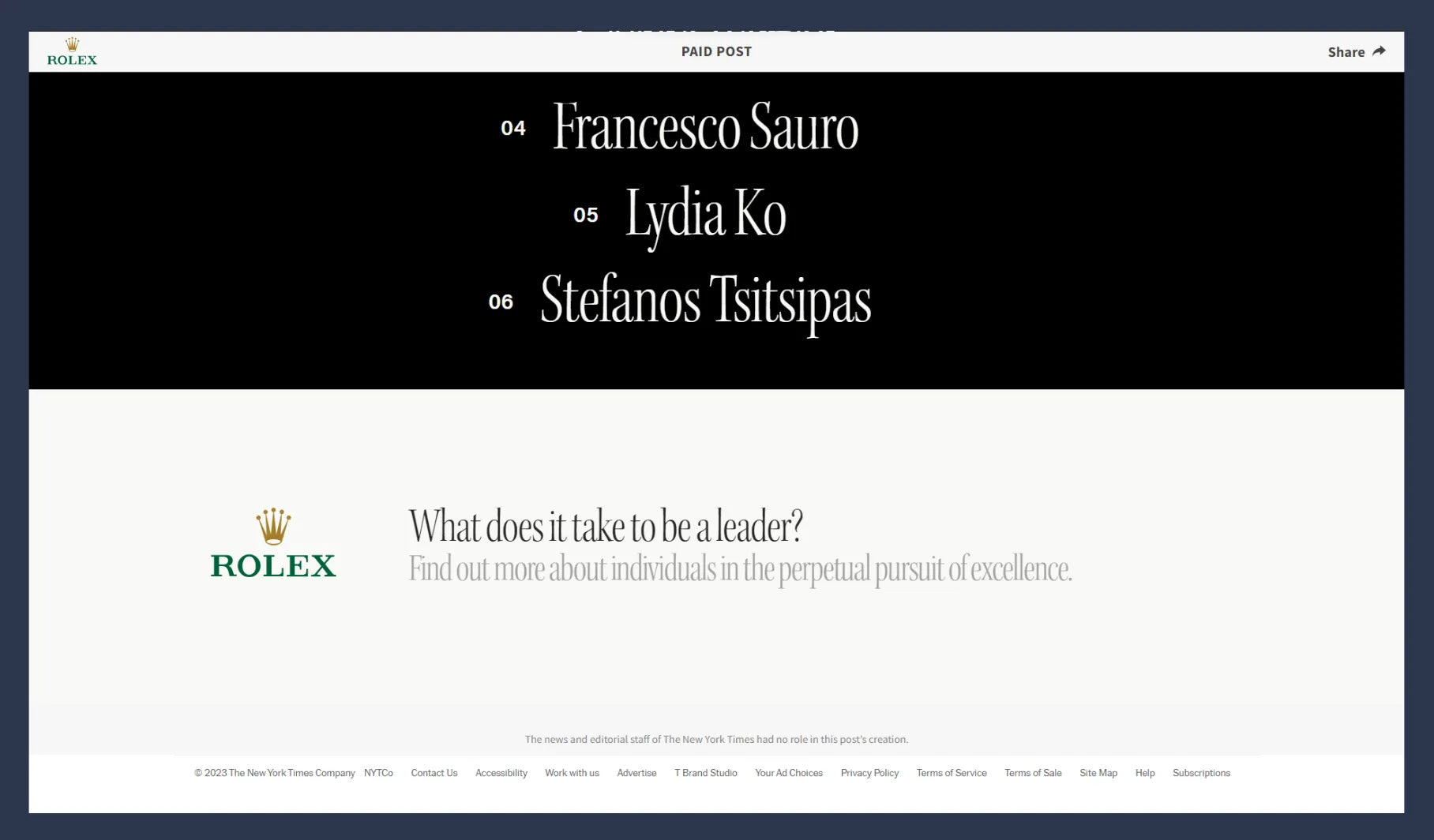
DOWNLOAD EBOOK: A Beginners' Guide to Shopify Advertorials
2. Allbirds
Allbirds is one of the most popular sustainable shoes and clothing brands and it's powered by Shopify. Allbirds’ paid post is one of the most creative advertorials we came across.
The brand has used spectacular visual and audio elements to share its message about the role and importance of birds in protecting our environment.
Key Takeaways from Cole Haan’s Advertorial:
Allbirds uses the advertorial to showcase its great mission.
Throughout the post, you won’t find a single mention of Allbirds products — simply because that’s not the primary purpose of this paid post. Instead, this post shares amazing information about some of the beautiful species of birds that have a positive impact on our planet and how we can help these birds.
The CTA button leads to the brand’s “Our Commitment” page.
Considering the purpose of this post, it’s great to see the CTA button at the end of the post, which does not lead to the brand’s products or collections. Instead, it redirects to the brand’s “Our Commitment” page where it explains how the brand is working on reducing carbon footprint.
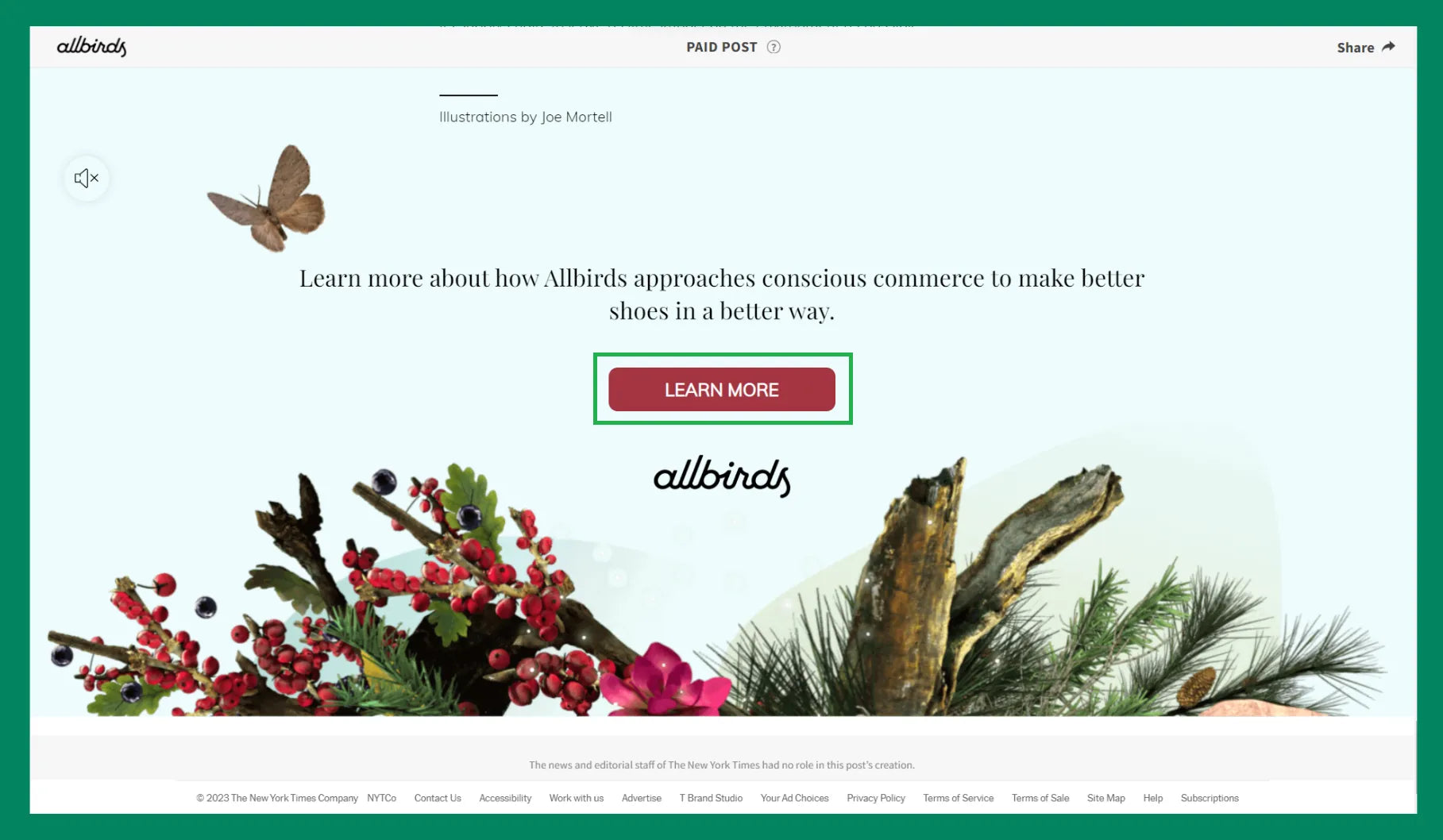
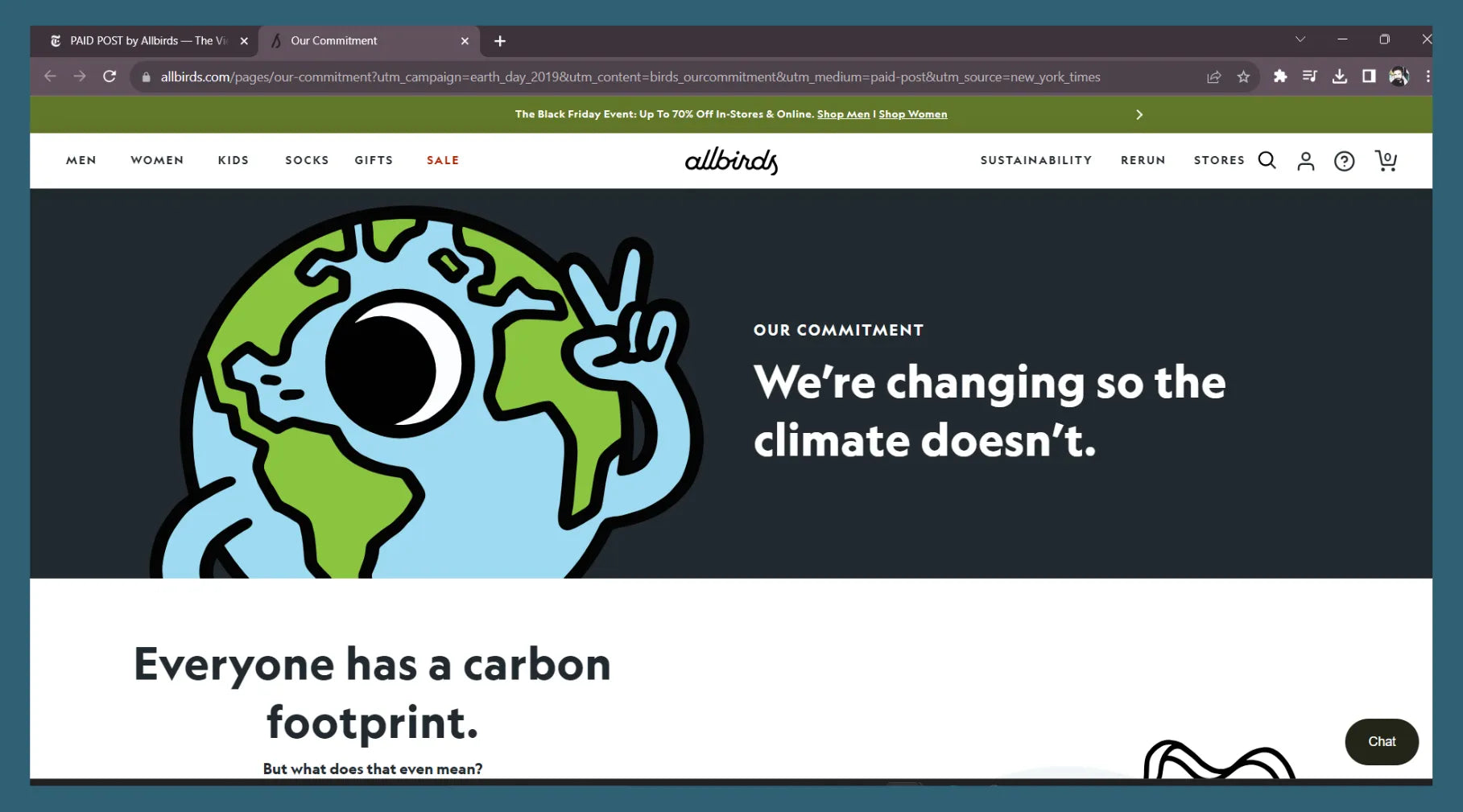
Pro tip: If you’re using Shopify, you can create visually appealing pages to showcase your brand’s mission, values, or commitments using GemPages. GemPages can help you create all types of store pages with a premium design using features such as AI-powered image-to-layout feature, drag-and-drop visual editor, professionally designed templates, and much more.
Learn more: Top Advertorial GemPages Template tailored your Niches
3. Birkenstock
Birkenstock is one of the old (founded in the 18th century) and popular brands that crafts premium and high-quality shoes. This paid post is actually a series of three short video episodes.
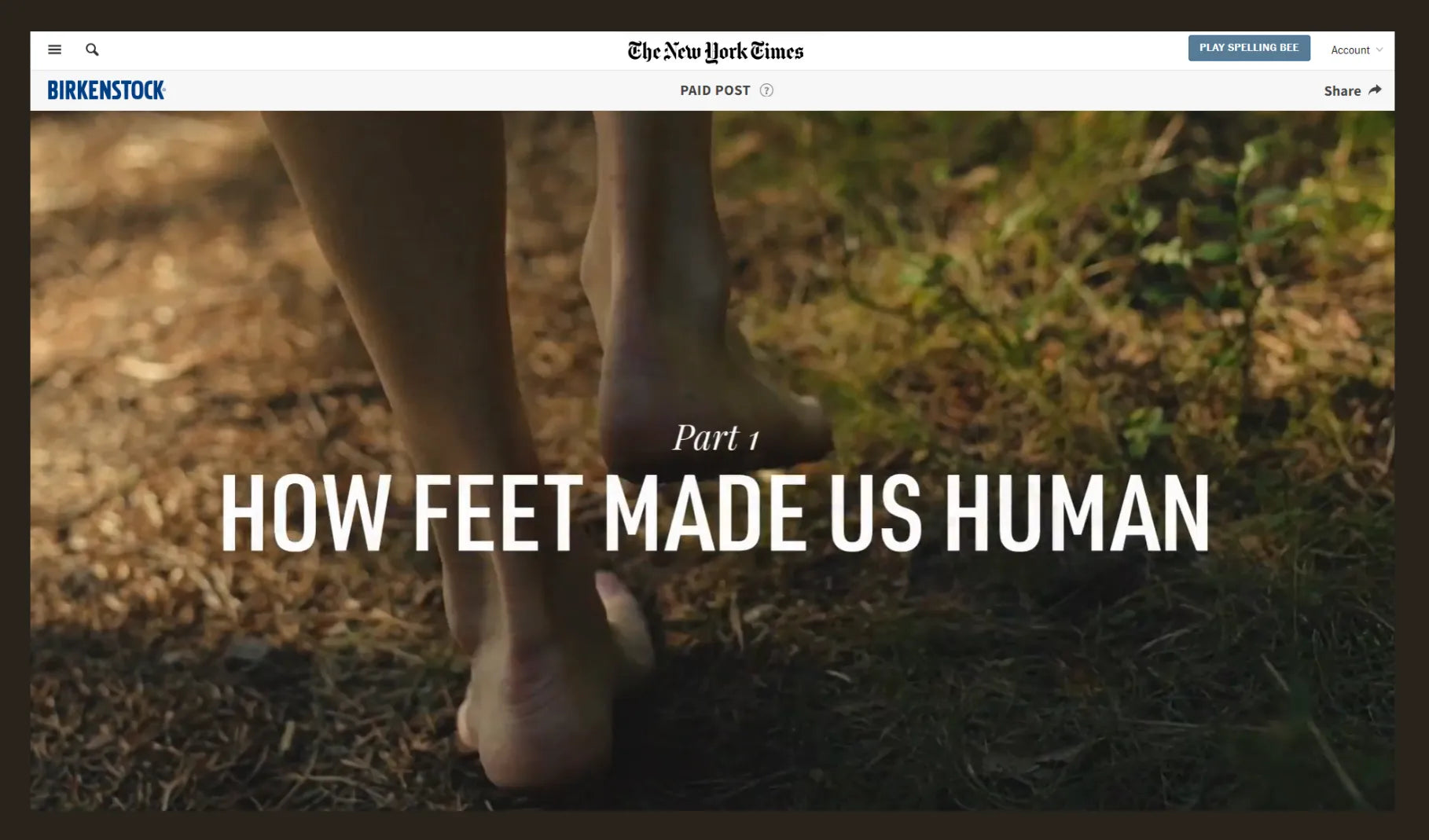
Key Takeaways from GAP’s Advertorial:
Use of smart storytelling that’s relevant to the product.
Since Birkenstock is a footwear brand, it has used its unique storytelling approach. The first episode starts with the story of the evolution of humankind, the role of feet in that evolution, and how we should take care of our feet.
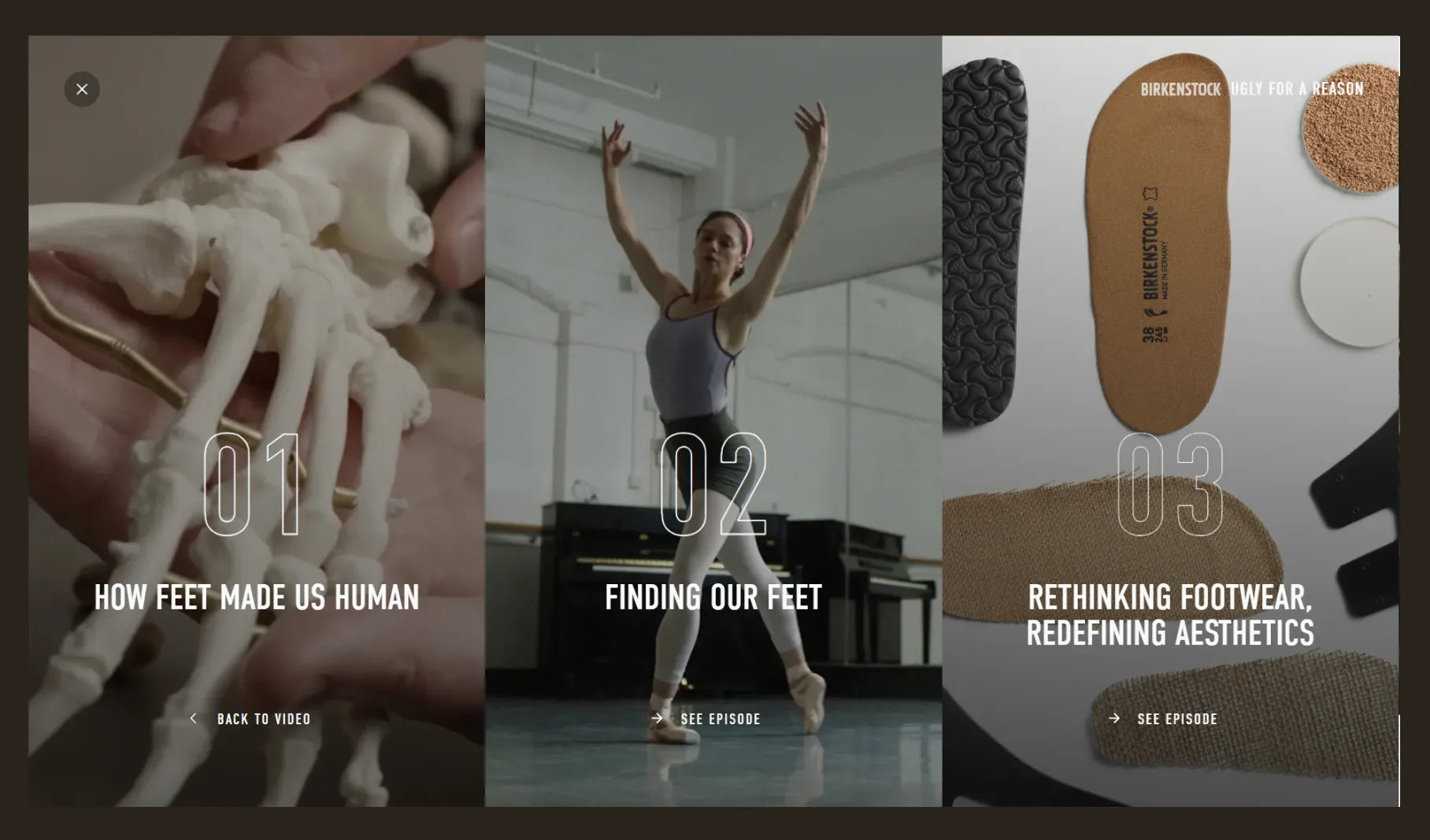
And then, Romany Pajdak, a ballet dancer (along with another expert) explains the importance of foot health. All this in-depth research also indicates how the brand is paying attention to the detail when crafting its products.
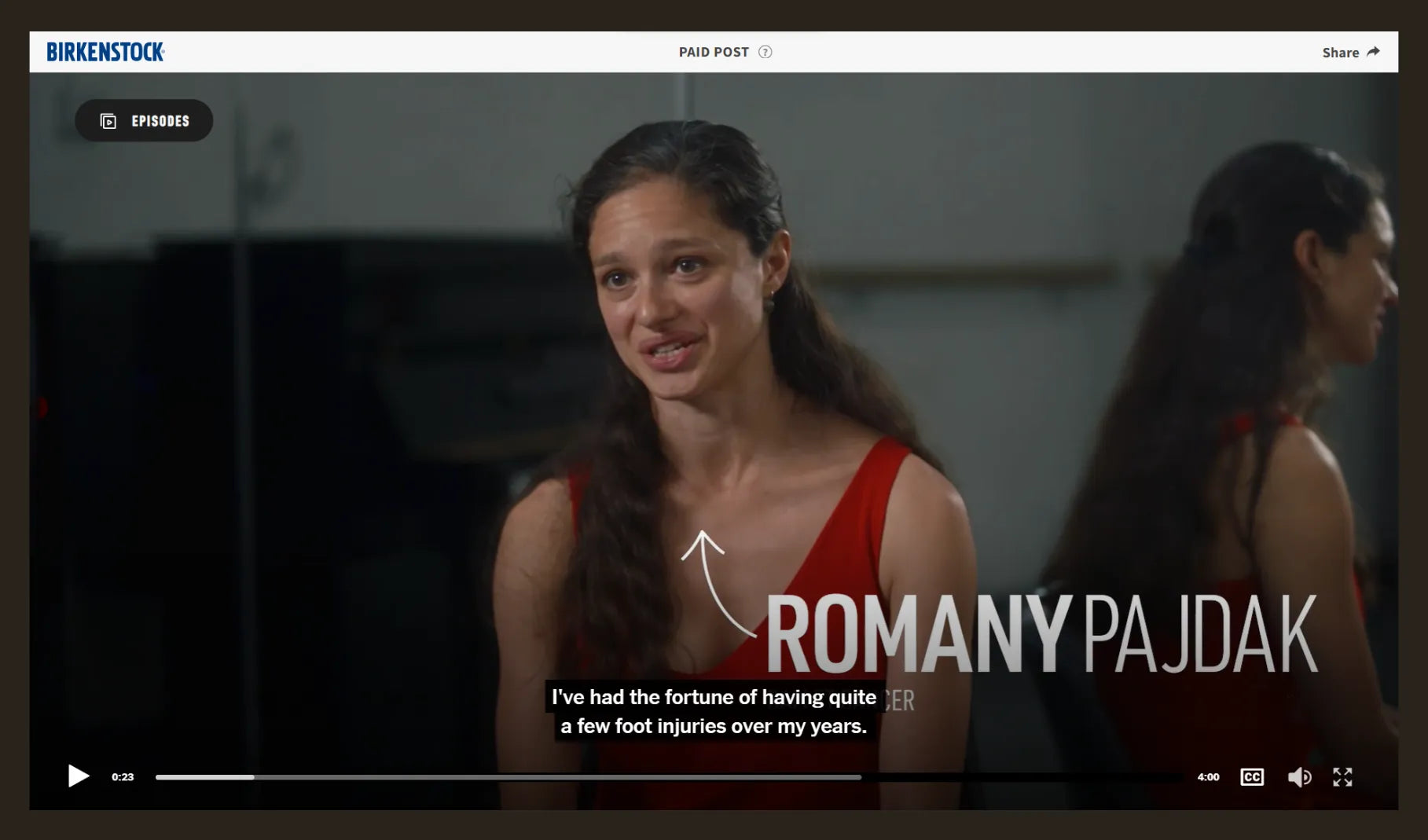
Uses the CTA button to drive traffic on a landing page.
In the bottom section of the paid post, Birkenstock has given a CTA button that redirects to a professionally designed landing page.

On this page, the brand has also explained its philosophy and displays different products. However, the important thing is that once a user has landed on this page, it creates more opportunities for the brand as the user may explore the other website pages or products as well.
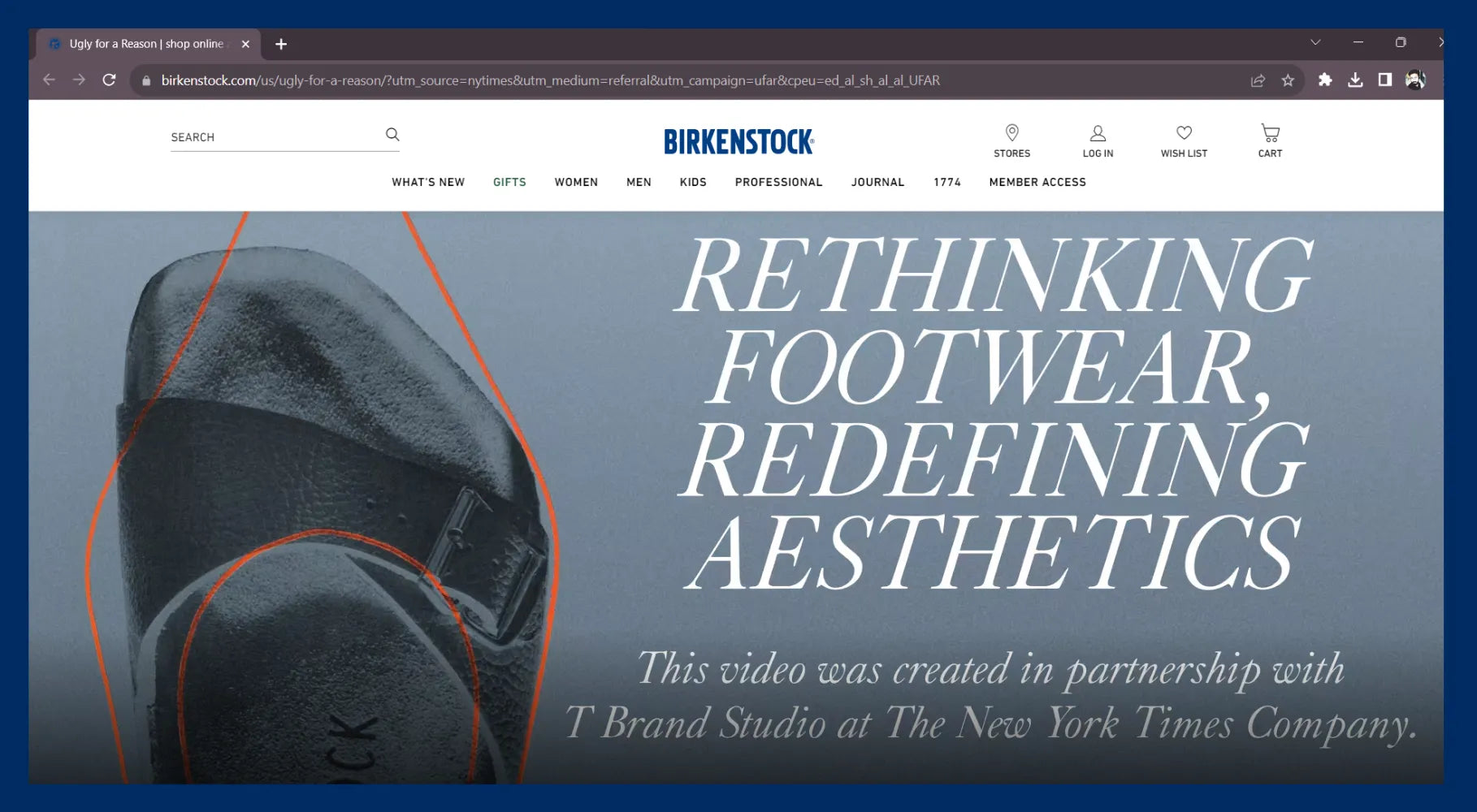

4. Cole Haan
This advertorial by Cole Haan published on Forbes, a well-known media company, helps readers gain insights on how creativity can be shared.
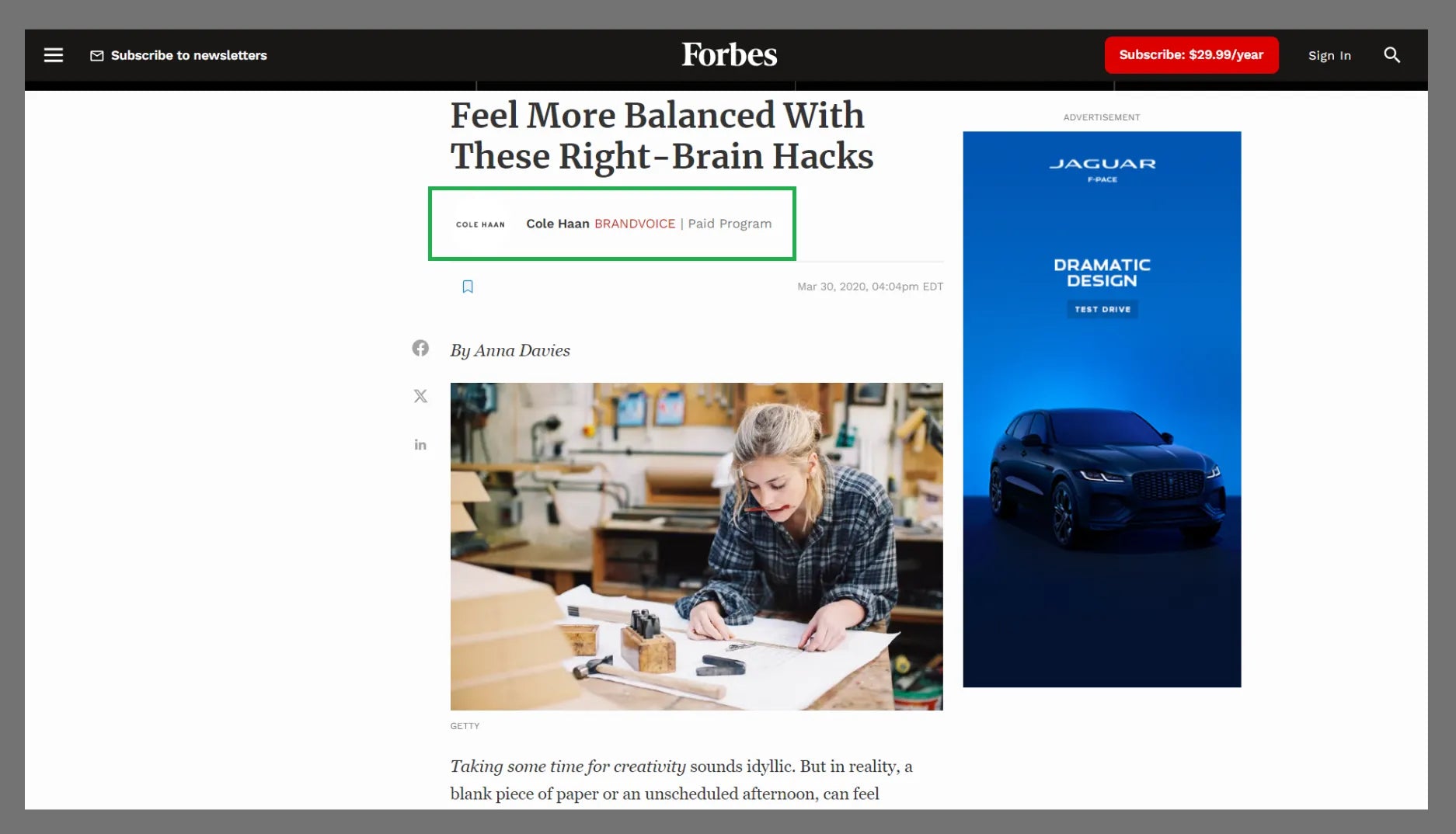
Key Takeaways from Cole Haan’s Advertorial:
Create a click-worthy headline.
The headline of this advertorial focuses on the benefit — "Feel More Balanced" — and that’s why readers are more likely to engage with this post.
Mention the details of the author.
Providing the author's details increases the authenticity and trustworthiness of the post. It shows that the post is written by a third party.
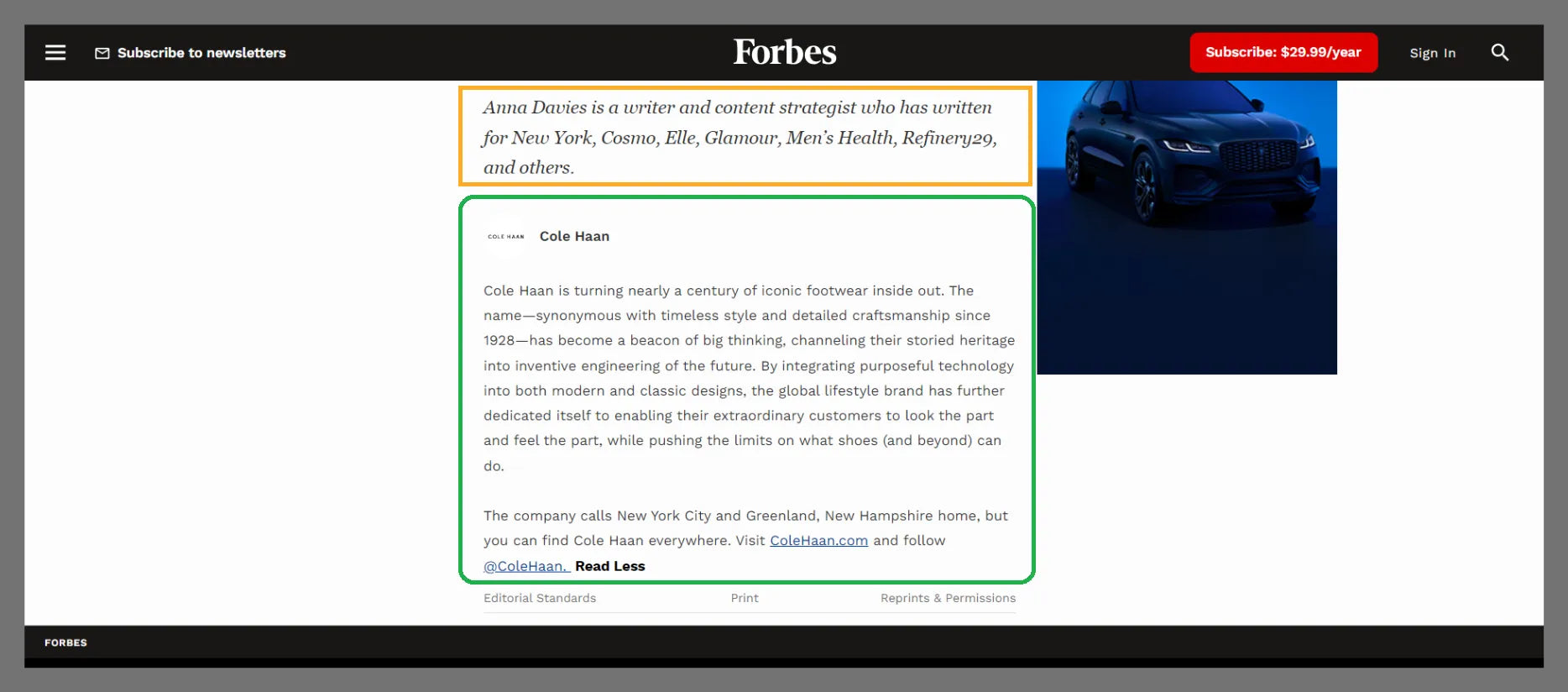
At the end of the advertorial, the website link as well as the social media account link is provided for the readers.
5. Carolina Herrera
Let’s take a look at this sponsored post by Carolina Herrera that shares 7 different tips to become a "Pro Packer" for the holiday season.
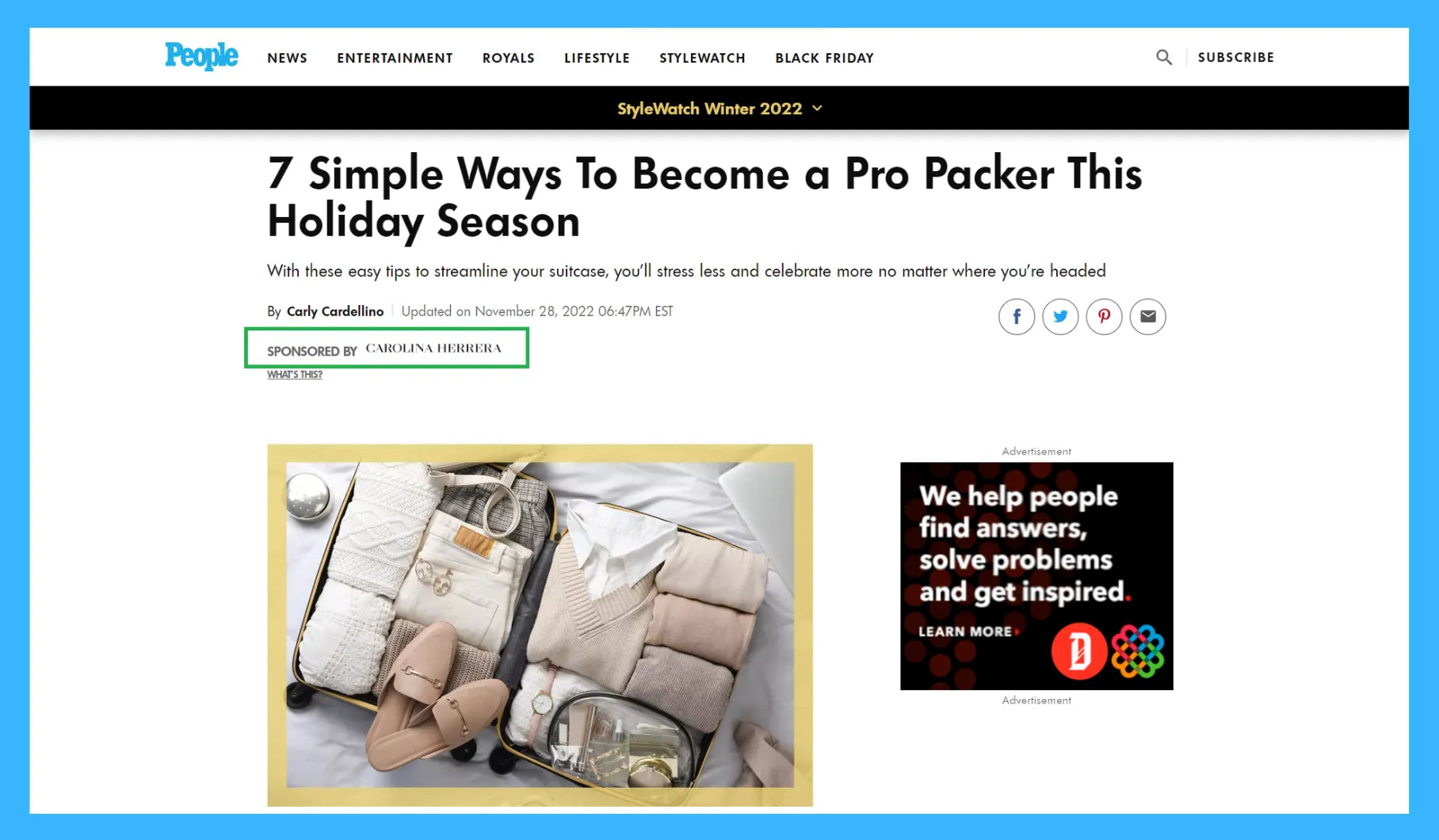
Key Takeaways from Carolina Herrera’s Advertorial:
Carolina Herrera has chosen a relevant topic.
Carolina Herrera is an online brand that offers a variety of products including fragrances, makeup, clothing, accessories, and holiday gift items. Thus, the topic chosen by the brand is not only valuable to the audience but also gives the brand an opportunity to place its promotion organically in the post.
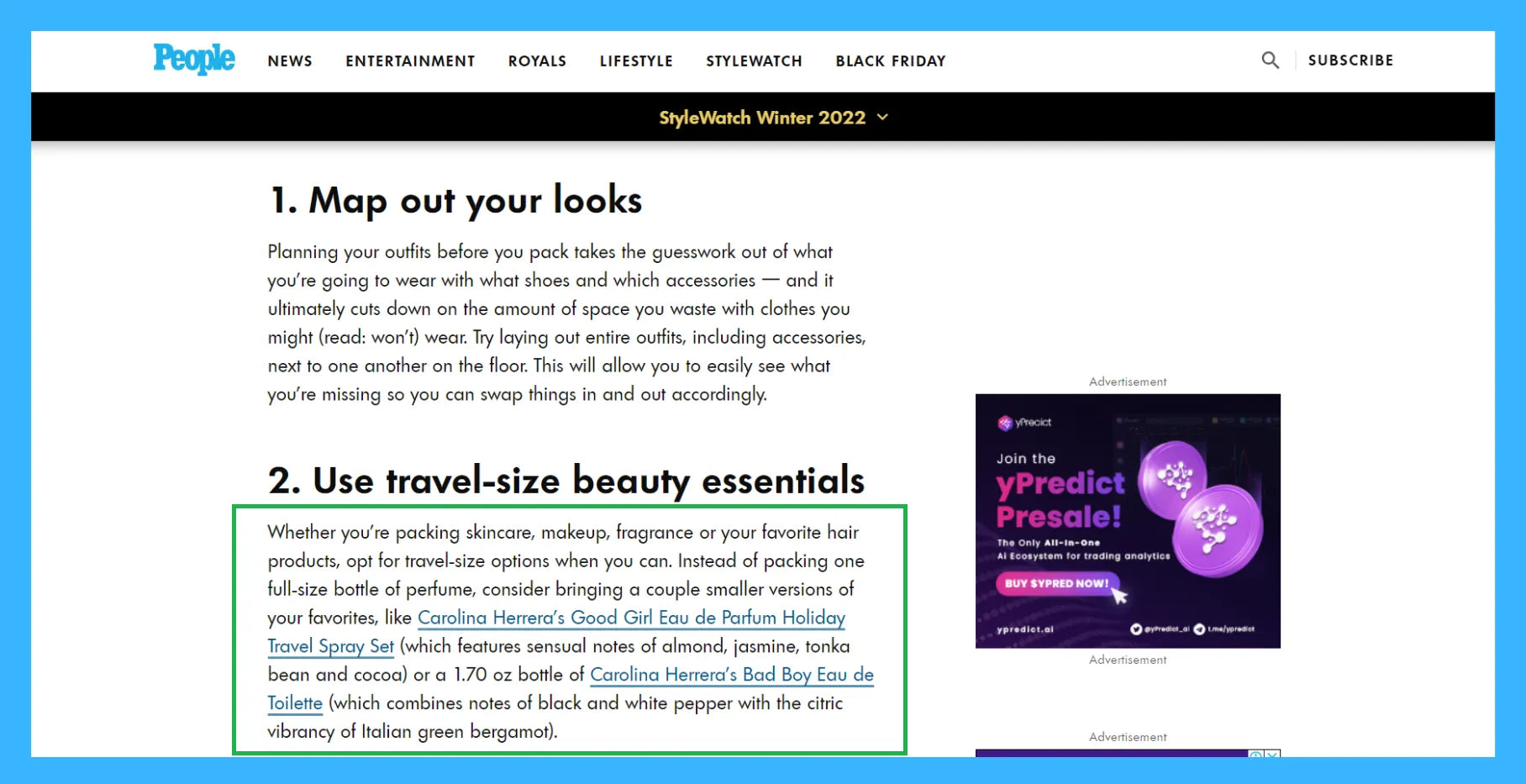
Closing the post with a simple CTA.
At the end of the post, the brand nudges the readers to carry their favorite scent and check out travel-size fragrances. Interestingly, the brand doesn’t provide any links in this last paragraph.
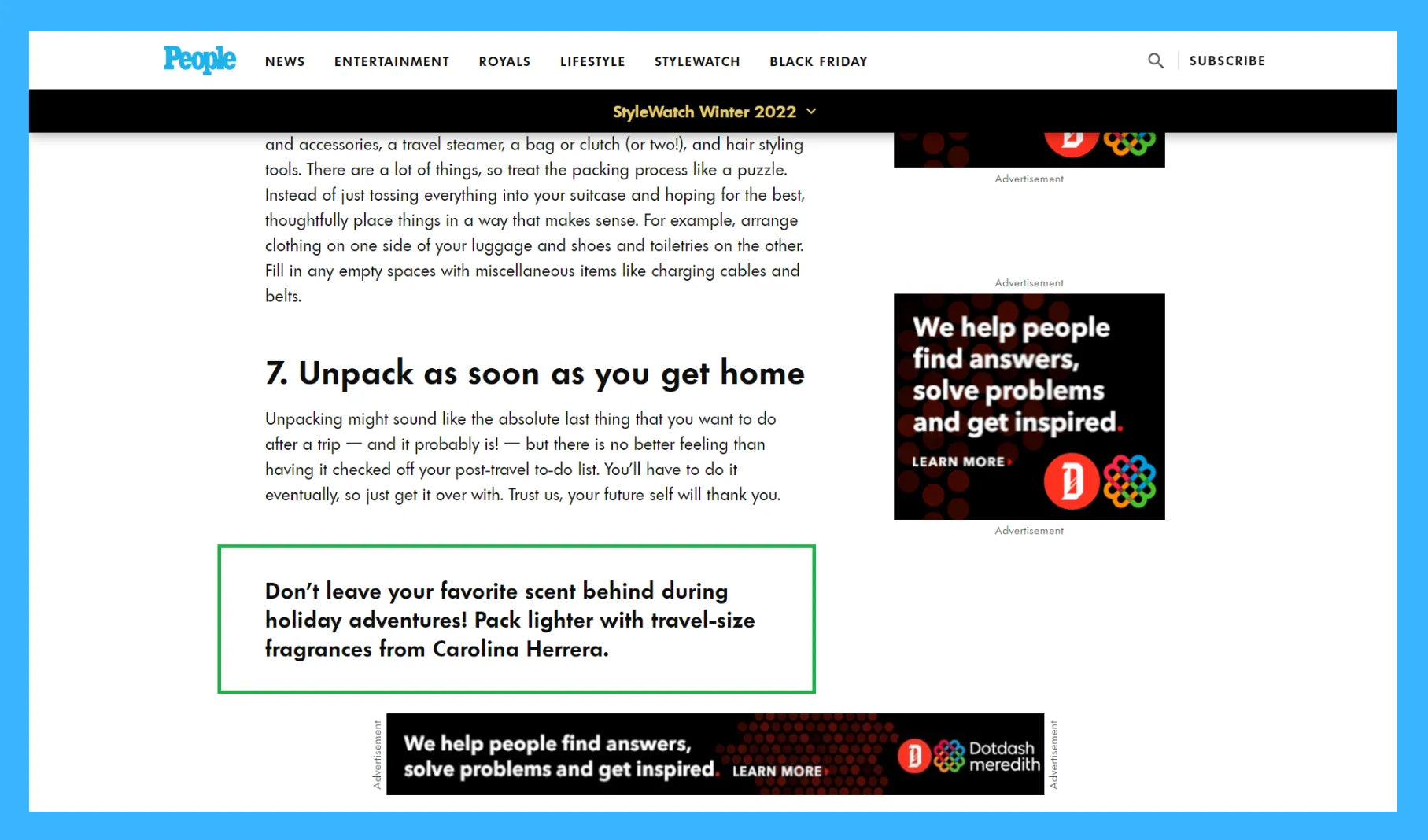
6. Love Beauty And Planet
Love Beauty and Planet is a brand that offers hair and body care products. The paid post published by Love Beauty and Planet talks about the issue of climate change and global warming.
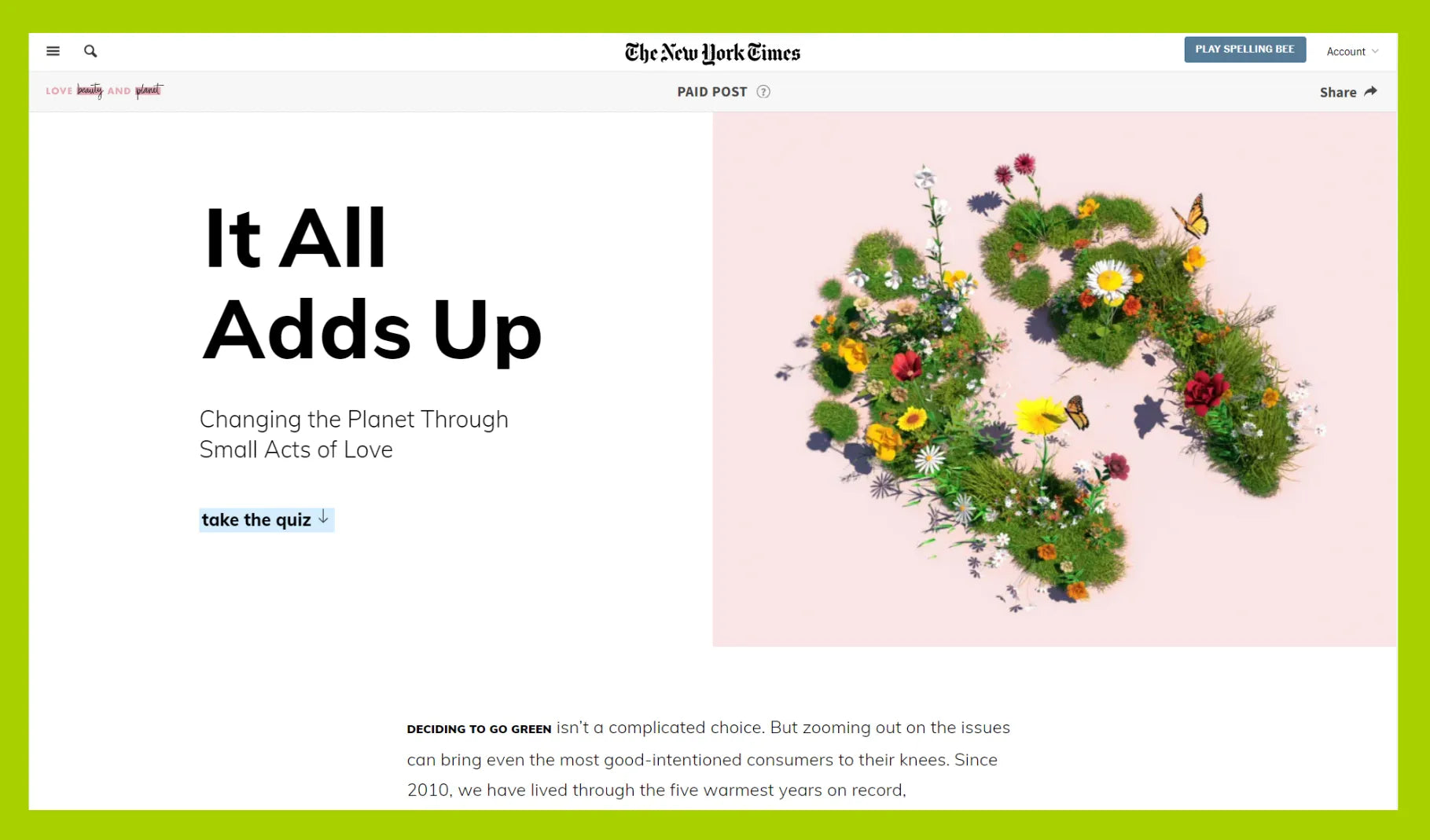
Key Takeaways from the Advertorial by Love Beauty and Planet:
Love Beauty Planet’s philosophy to save the environment.
The post explains how going green in a short time may become a daunting task and how we can make progress in this direction by thinking small.
The brand uses the creative element of a quiz for the readers.
This post includes a great idea to increase engagement, i.e., encouraging readers to take part in a quiz about the facts related to the environment. And we all know that quizzes are always fun.
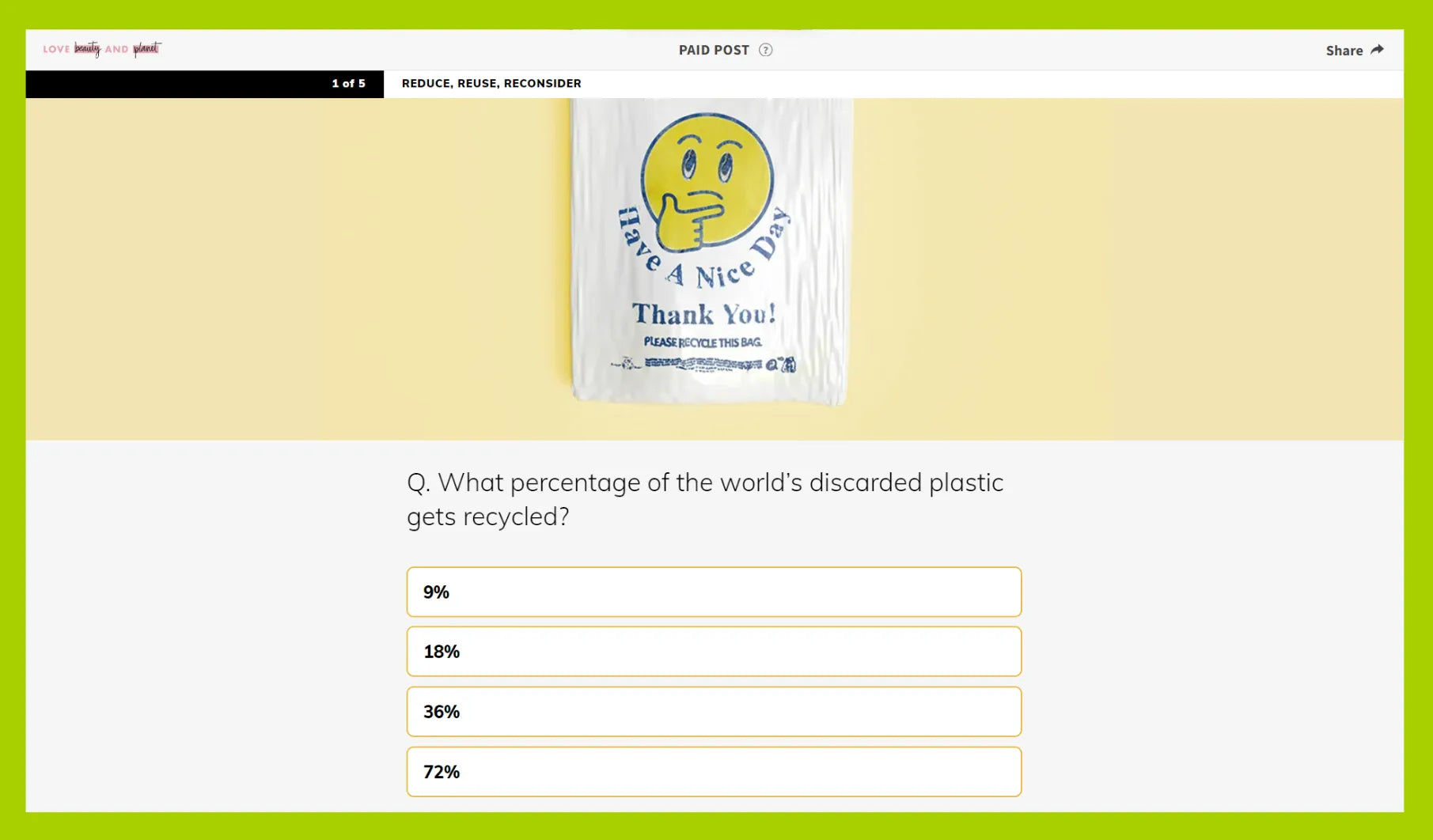
Pro tip: Just because a successful brand has followed a certain style in its advertorial doesn’t mean you should follow the same style. Different advertorial campaigns may have different goals.
For example, for some of the brands; the primary goal may not be a conversion but to send a message to the world about its brand’s positioning and authority. However, some other brands may promote the website or product link if their goal is to generate conversion through advertorials.
Decide what’s your goal and execute it accordingly.
7. GAP
GAP’s sponsored post in People magazine is an excellent example of how you can bring creativity and style to your advertorial.
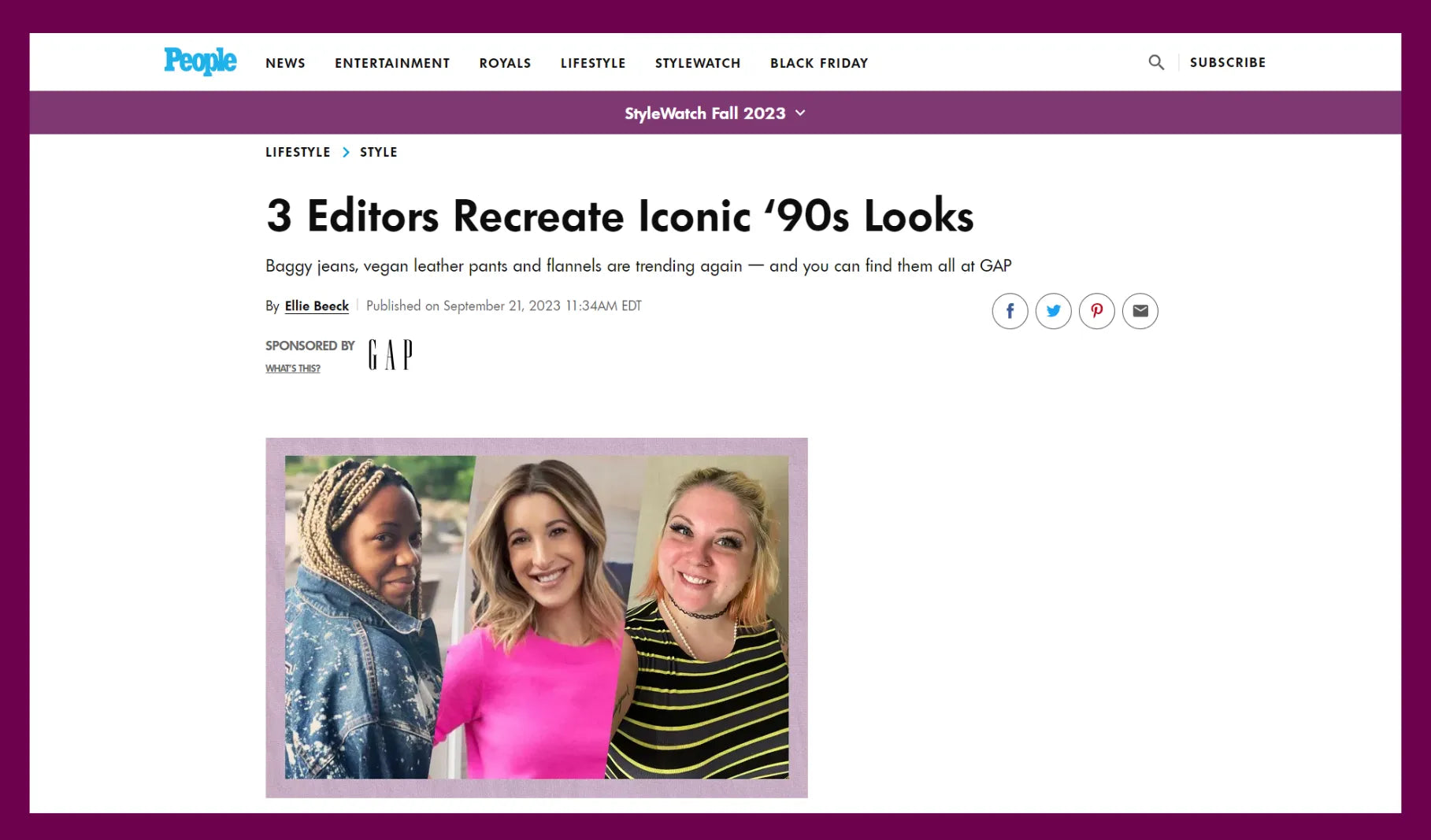
Key Takeaways from GAP’s Advertorial:
GAP uses a creative idea to share a collection of products.
GAP brilliantly shares its collection of “Iconic ‘90s look” through this advertorial. In this post, three editors are sharing how they created the iconic look. By doing this, the brand also promotes relevant products that can entice readers to try the same look.
It has created a conversion-optimized closing and CTA.
GAP has provided a list of five products along with the pricing and product links. The CTA encourages readers to explore more of its products by providing the link that redirects to GAP’s collection.
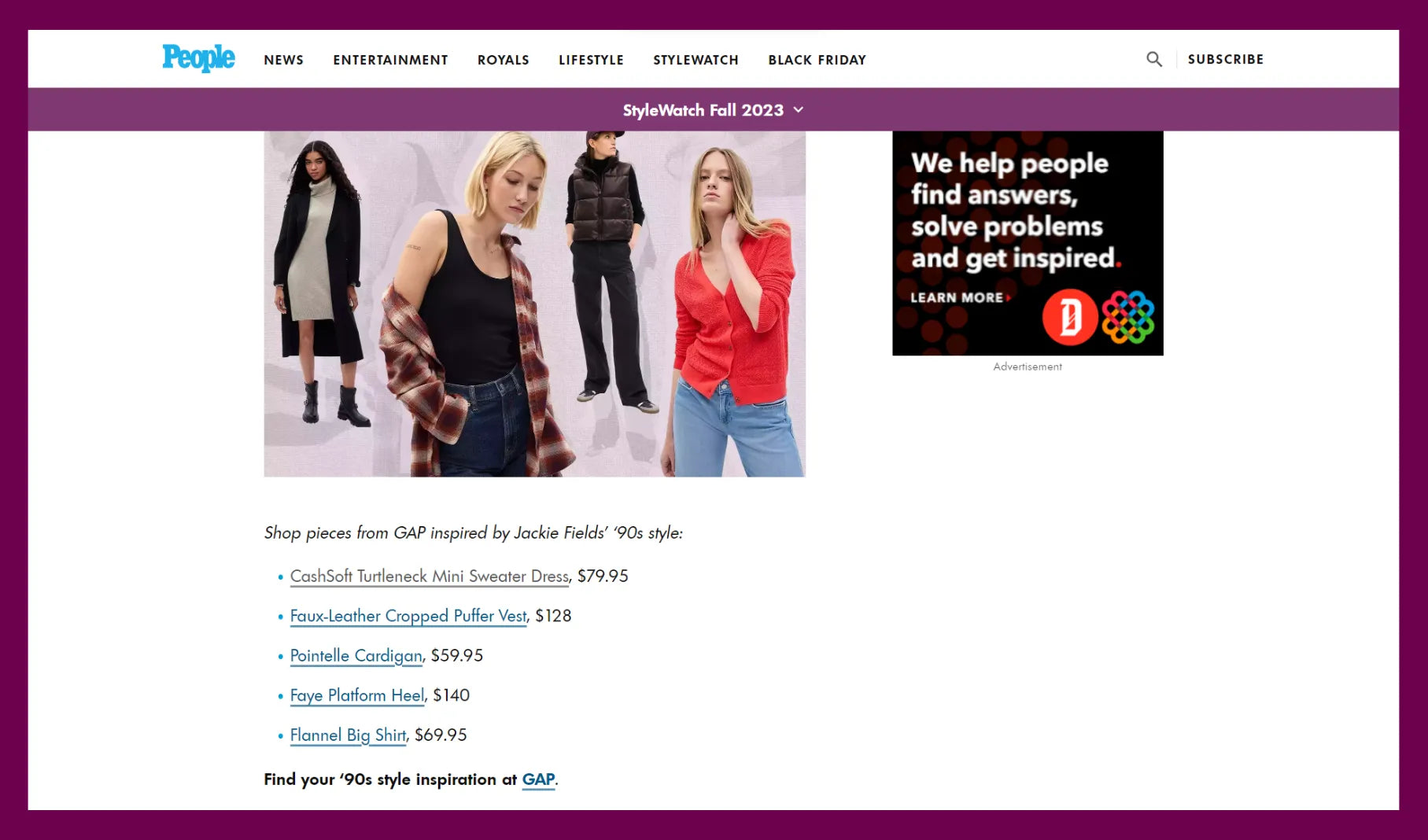
How to Write an Advertorial?
-
Write a Compelling Headline
On average, 80% of users read just the headline copy and ONLY 20% of users go on to read the further content. If your headline doesn’t sound like an interesting read, chances are users will exit the post without reading the content that you might have put together with great effort.
-
Focus on Offering Value and Not Promotion
It’s meant to be an “advertorial” for a reason. Make sure you write high-quality content that provides valuable insights to the readers. Use expert insights (if applicable) to enhance the value of your content.
Pro tip: Perform research on your target audience even before writing a single word or choosing your topic. Try to understand what information they are seeking through online publications OR what could be an inspirational piece of content for them — and then create your advertorial to deliver helpful or inspiring content for your audience.
-
Don’t Make it a Sales Pitch
Use the storytelling technique and tell a compelling story. It makes your content more enticing for reading and helps you create an emotional bond with your customers. Even if your content revolves around your product, make sure it doesn’t sound “salesy” as it might hurt the reader’s trust and engagement.
-
Follow the Right Format
Conduct research and review what format is best for the publishing platform and implement the same in your advertorial. The idea is that the readers must feel that they’re reading a post with quality content and not an advertisement.
-
Close with an Enticing CTA
Once your post is completed, add the details about your brand’s website URL or any specific product or landing page URLs depending on your post content. Drive the readers to take action by creating a clear and enticing CTA.

Requirements to Consider When Using Advertorials
Consider FTC’s Guidelines for Advertorials
You and the publisher of your advertorial need to ensure that the guidelines and requirements of the Federal Trade Commission (FTC) are followed when publishing the advertorials.
Since the advertorials appear similar to the other unpaid editorial content, it’s likely that readers may confuse advertorials with editorials. Thus, the FTC requires that your advertorial must clearly state that it's paid content to provide transparency to the readers.
As we’ve already seen in the examples above, all the advertorials had some sort of indicator like “Paid Post”, “Paid Program”, or “Sponsored By.
FTC has also published an “Enforcement Policy Statement on Deceptively Formatted Advertisements” in case you’d like to dive deeper into this subject.
Consider Google’s Guidelines for Advertorials
Apart from FTC guidelines, you should also consider Google’s “Spam policies for Google web search” from an SEO (Search Engine Optimization) perspective.
You must ensure that your advertorial does not indulge in link spamming. If Google finds that a post or page has links that are trying to manipulate Google Search rankings, it may consider such links as spam.
Here’s the definition and example of link spam as described by Google:
“Advertorials or native advertising where payment is received for articles that include links that pass ranking credit, or links with optimized anchor text in articles, guest posts, or press releases distributed on other sites.”
For example:
“There are many wedding rings on the market. If you want to have a wedding, you will have to pick the best ring. You will also need to buy flowers and a wedding dress.”
Learn more: Shopify Features and Benefits (+ Shopify Plus Features) — a Detailed Overview
Final Thoughts on Advertorials
With time, customers have changed their approach toward advertisements, and so you need to evolve your approach too.
That said, don’t get us wrong!
Advertisements are still effective. You can definitely use them! However, advertisements alone may not be the right strategy.
And that’s why, advertorials can become an effective strategy to promote your brand and its products or services.
Now that you have all the information, ideas, and inspirations — are you ready to use advertorials for your business? If yes, don’t forget to check out GemPages to create your landing page for all the advertorial-based traffic.




 Facebook Community
Facebook Community Change Log
Change Log Help Center
Help Center












